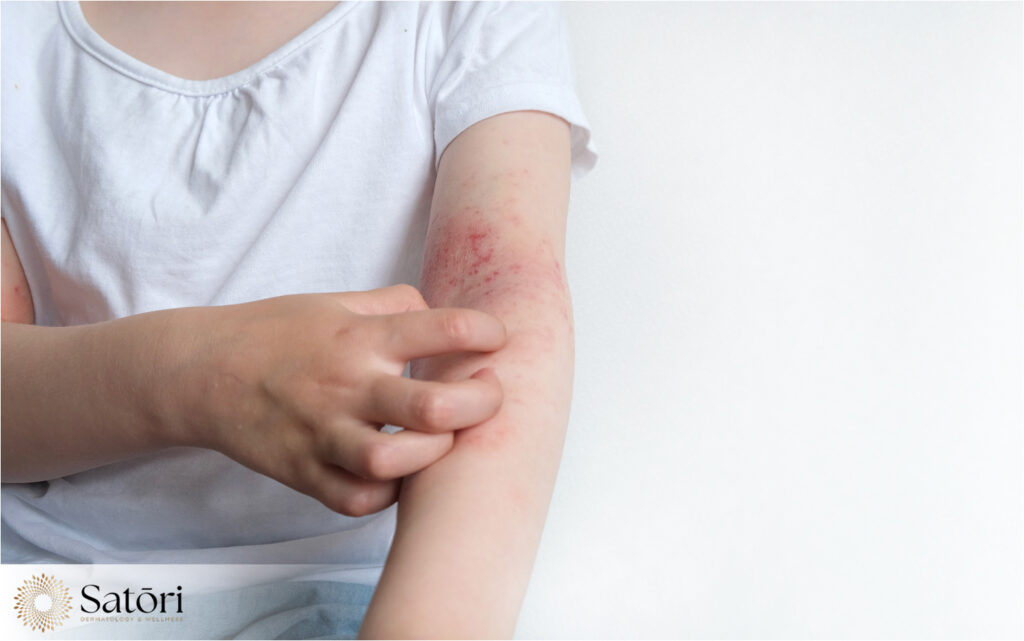Living with eczema or psoriasis can feel like your skin is at the mercy of the elements—especially here in Tennessee, where our weather patterns can shift dramatically from week to week and season to season. That sensation of dread when you feel the first itch of a flare-up as the seasons change is all too familiar for many of our patients.
At Satori Dermatology and Wellness, we regularly see patients struggling with seasonal flare-ups. Many notice their skin worsening in the fall, experience improvement during summer months only to face severe symptoms in winter, or develop new symptoms after relocating to Tennessee.
The connection between Tennessee’s distinctive seasonal patterns and skin condition flares isn’t coincidental. The unique combination of our region’s high-humidity summers, pollen-heavy springs, fluctuating fall temperatures, and dry winters creates a perfect storm of triggers for sensitive skin. What works for managing these conditions in January rarely suffices by July.
Navigating Skin Health Through Middle Tennessee’s Weather Shifts
When the dogwoods bloom in spring or the leaves begin their colorful transformation in fall, many Tennesseans experience more than just a change in scenery—they notice changes in their skin as well. For those living with eczema or psoriasis in the Franklin area, seasonal transitions can bring unexpected challenges.

Understanding Eczema and Psoriasis
Though often confused, eczema and psoriasis are distinct conditions with different underlying causes and appearances.
Eczema (atopic dermatitis) typically presents as red, itchy patches that may ooze or crust over when scratched. The affected skin often appears dry, scaly, and thickened. Eczema is closely linked to the body’s immune system and is commonly associated with allergies and asthma.
Psoriasis, meanwhile, manifests as well-defined, thick, red patches covered with silvery scales. Rather than primarily itching, psoriasis often causes burning or stinging sensations. This condition results from an overactive immune system that accelerates skin cell growth, causing cells to build up rapidly on the skin’s surface.
Both conditions can flare unpredictably—and many patients notice that changing seasons trigger these flare-ups.
Spring in Tennessee—Pollen Season and Skin Reactions
As Tennessee emerges from winter, the landscape explodes with pollen—particularly from oak, maple, and elm trees in early spring, followed by grasses and then ragweed as summer approaches. The Franklin area typically sees pollen counts peak in April and May.
For eczema sufferers, this airborne assault can translate directly to skin flares. Research shows that environmental allergens like pollen can trigger eczema symptoms when they contact the skin or are inhaled. Many patients don’t realize that their spring skin flares are connected to the same pollen affecting their sinuses.
During this season, we recommend tracking pollen forecasts and planning outdoor activities accordingly. Showering after spending time outdoors helps remove pollen from skin and hair, while changing clothes after coming indoors and washing them promptly prevents continued exposure. Using air purifiers with HEPA filters in your home, especially bedrooms, can significantly reduce indoor allergen levels. Applying moisturizer more frequently creates a protective barrier against environmental irritants.
Psoriasis patients may notice different patterns in spring. While rising humidity often helps psoriasis symptoms, the stress of managing seasonal allergies can trigger flares. Additionally, the transition from heavy clothing to lighter spring wear exposes affected skin, which can cause psychological stress for some patients.
Related Article: Eczema vs. Poison Ivy
Summer Heat, Humidity, and UV Exposure
Middle Tennessee summers bring high humidity and temperatures consistently in the 90s. This combination affects eczema and psoriasis patients very differently.
For many with eczema, humidity can be beneficial by helping skin retain moisture. However, heat-induced sweating often aggravates eczema, particularly in skin folds and creases. Swimming—a popular summer activity—presents its own challenges, as chlorine and pool chemicals can dry and irritate sensitive skin.
Summer management strategies for eczema include wearing lightweight, breathable fabrics like cotton and applying moisturizer while the skin is still damp after bathing. Using cooling towels or mists provides heat relief and can be one of the practical ways to sweat less without triggering flare-ups. After swimming, thoroughly rinsing with fresh water and immediately applying moisturizer helps counteract the drying effects of pool chemicals.
For psoriasis patients, summer often brings welcome relief. Moderate sun exposure typically improves symptoms, as UVB light slows the rapid cell growth that causes psoriasis plaques. Many patients report significant clearing during the summer months. However, sunburn can trigger new psoriasis flares—a phenomenon known as the Koebner response, where skin trauma leads to new lesions. Finding the balance between beneficial sun exposure and harmful overexposure is crucial for managing psoriasis during Tennessee summers.
Fall’s Fluctuating Weather Patterns
Fall in Tennessee brings dramatic temperature fluctuations—sometimes shifting 30 degrees in a single day. These rapid changes, combined with decreasing humidity and stronger winds, create challenging conditions for sensitive skin.
The lower humidity levels begin to dry out the skin’s natural barrier, making both eczema and psoriasis more prone to flaring. As home heating systems activate for the first time in months, indoor air becomes even drier, further compromising skin health.
For both conditions, fall requires a transition to more intensive moisturizing routines. Consider switching to heavier, cream-based moisturizers rather than lightweight summer lotions. Gently exfoliating helps remove dead skin cells that can block moisturizer absorption. Installing a humidifier as heating systems come online maintains healthier moisture levels indoors. The key is gradually transitioning skincare routines before symptoms worsen, rather than waiting for a full-blown flare.
Many patients find that fall is when prescription treatments may need adjustment—either temporarily increasing potency or frequency of application to prevent the flare-ups that commonly occur with the season’s first cold snap.
Winter Dryness and Indoor Heating Challenges
Winter presents perhaps the greatest challenge for skin condition management in Tennessee. Indoor heating systems create desert-like conditions inside homes and workplaces, while cold outdoor temperatures and wind further compromise the skin barrier.
For eczema patients, this extremely dry air often leads to itching, cracking, and bleeding. The winter itch cycle becomes difficult to break—dry skin itches, scratching damages the skin barrier, and damaged skin becomes even more reactive and prone to infection.
Psoriasis typically worsens during winter months as well. The beneficial UV exposure of summer disappears, stress levels often increase around holidays, and respiratory infections that can trigger psoriasis flares become more common.
Winter management focuses intensively on moisture retention through limited bath and shower temperatures and durations. Applying prescription medications and moisturizers immediately after bathing locks in essential moisture. Overnight treatments with occlusive ingredients provide intensive repair while you sleep. Running humidifiers in multiple rooms counteracts the drying effects of heating systems. Staying well-hydrated despite reduced thirst signals in winter also supports skin health from the inside out.

Our Approach to Seasonal Management
At our practice, we’ve developed specialized protocols for helping patients transition between seasons seamlessly. Rather than waiting for flares to occur, we work proactively with patients to adjust their treatment regimens before seasonal changes trigger symptoms.
This might include gradually increasing treatment intensity as summer transitions to fall, scheduling phototherapy sessions more frequently during winter months, or temporarily adding anti-inflammatory treatments during peak allergy season.
We employ advanced diagnostic tools to identify specific triggers for each patient. Many are surprised to learn that their condition responds to environmental factors they hadn’t considered—from specific tree pollens to changes in barometric pressure common during Tennessee’s spring storm season.
Our dermatologists combine decades of experience treating these conditions in our specific climate with the latest research and treatment options. This allows us to provide truly personalized care that accounts for both the unique aspects of Tennessee’s seasons and each patient’s individual condition.
Moving Forward With Healthy Skin Year-Round
Managing eczema and psoriasis effectively requires understanding how your specific triggers interact with our local environment. While these conditions don’t yet have permanent cures, modern eczema treatments and proactive seasonal planning can dramatically reduce their impact on your daily life.
If you’ve struggled with unpredictable flares as seasons change, consider scheduling a consultation to develop a personalized seasonal management plan. Our dermatologists can help you identify patterns you might have missed and provide treatments tailored to our unique Middle Tennessee climate.
Don’t let changing seasons dictate your skin’s health or your quality of life. With the right approach, you can maintain comfortable skin throughout the year—from the humidity of August to the dry chill of January and everything in between.
To schedule an appointment or learn more about our specialized approach to eczema and psoriasis management, contact our Franklin office today.

